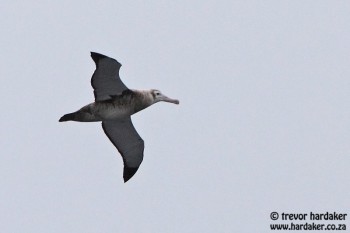The Indian Ocean Tuna Commission (IOTC) has produced a detailed report on the status of seabirds in the Indian Ocean. The report forms part of a larger study that summarizes the status of tuna and tuna-like species under the IOTC mandate, as well as other species, such as billfish, sharks and turtles, which are impacted by IOTC fisheries.
The report covers 19 seabird species, all but four being ACAP-listed albatrosses and petrels, reported as caught in fisheries within the IOTC area of competence. It states that the “level of mortality of seabirds due to fishing gear in the Indian Ocean is poorly known, although where there has been rigorous assessment of impacts in areas south of 25 degrees (e.g. in South Africa), very high seabird incidental catches rates have been recorded in the absence of a suite of proven incidental catches mitigation measures.”

Amsterdam Albatross occurs in the Indian Ocean, photograph by Trevor Hardaker
The report further notes that:
the available evidence indicates considerable risk from longline fishing to the status of seabirds in the Indian Ocean, where the best practice seabird incidental catches mitigation measures outlined in IOTC Resolution 12/06 On Reducing the Incidental Bycatch of Seabirds in Longline Fisheries are not implemented;
CPCs (Cooperating non-Contracting Parties) that have not fully implemented the provisions of the IOTC Regional Observer Scheme outlined in Paragraph 2 of IOTC Resolution 11/04 On a Regional Observer Scheme shall report seabird incidental catches through logbooks, including details of species, if possible; and
appropriate mechanisms should be developed by the Compliance Committee to assess levels of compliance by CPCs with the Regional Observer Programme requirements and the mandatory measures described in Resolution 12/06.
John Cooper, ACAP Information Officer, 07 February 2014

 English
English  Français
Français  Español
Español